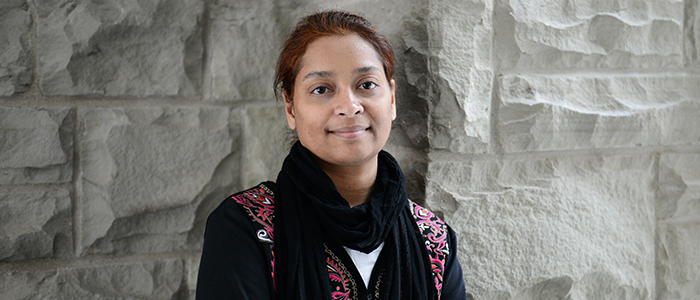Choosing the road less travelled

After obtaining a medical degree in her home country of Bangladesh, Dr. Sharifa Nasreen opted to pursue a career in research instead of clinical practice. Going against the grain seemed natural for her, and she has since obtained her Master of Public Health degree, taught undergraduate medical students, and spent years working at an international research organization where she emerged as a leader in public health.
With the goal of becoming an epidemiologist and making the most of underutilized medical data, Dr. Nasreen is now enrolled in the Department of Epidemiology and Biostatistics’ PhD program. She sat down with us to discuss her career choices in more detail, and the potential research she will be working on throughout the next three years.
Where were you born and raised, and what is your education background?
I was born in Bangladesh, so I had my basic education there. I’m a medical doctor by training, and my medical graduation was also in Bangladesh. After my medical degree, I obtained my Master of Public Health (MPH) at one of the largest public health universities in Bangladesh. I started the Department of Epidemiology and Biostatistics’ PhD program in September 2015 and it’s a four-year program.
Tell me about the time you spent working before you decided to earn your PhD.
There was quite a gap between when I obtained my MPH degree and when I started the PhD program. After teaching undergraduate medical students for a couple of years after graduating, I got the opportunity to work in an international research organization based in Bangladesh called the International Centre for Diarrhoeal Research, Bangladesh (ICDDRB). I started working there in June 2008 and it was a phenomenal, unique experience for me. I joined their team as a junior research investigator, and my job responsibilities were very broad — everything from writing protocol for research studies to hiring staff members and managing a budget.
Why did you decide to enroll in the Department of Epidemiology and Biostatistics’ PhD program at this point in your career?
The MPH program was an eye-opener for me, because the program was multi-disciplinary and gave me a broader perspective beyond traditional education. At that time, I also started enjoying epidemiology, but I knew that if I wanted to complete a PhD program I would need more experience and skills. From that point, I knew that I wanted to become an epidemiologist, but I also knew that I should get more work experience and publish a few papers.
Why did you decide to get your PhD at Schulich Medicine & Dentistry?
I was specifically looking for epidemiology programs. Many schools have different programs that have to do with global health, but no other university programs specifically matched the skills and interests I was looking for. When I was looking at the curriculum and courses that the Department of Epidemiology and Biostatistics applied, and the analytical and clinical epidemiology that Schulich Medicine & Dentistry had to offer. By the time I started the program, my husband and I had already immigrated to Canada, so it made the most sense overall.
Tell me about the research you’re working on and its potential impact.
My thesis isn’t finalized yet — I’m still exploring different research areas with my supervisor. Currently I am considering doing my thesis on the effectiveness of antiviral medications on patients with hepatitis B or hepatitis C virus infection, and their impact on the long-term outcomes on cirrhosis hepatocellular carcinoma.
Also there are certain anti-viral drugs, but the anti-viral use uptake is slow among Canadians from what I’ve read in the public health literature. I think this is an area where I could explore and see the effects of drugs to provide real valuable information about whether the drugs are working or not, and to explore why people are not taking the drugs. It would help the infected patients to make education decisions about which treatment to take, as well as the physicians in being able to confidently guide their patients.
As you said, you’re a medical doctor by training. Why did you decide to pursue research instead of a clinical practice?
Most of the graduates from medical school, especially in Bangladesh, go into the clinical side instead of the research side. While I was an interning doctor at the largest public health hospital in Bangladesh, I was dealing with a variety of cases. Somehow I had a feeling we were sitting on a lot of data, but we were not doing anything with it. That’s when I started thinking I needed to study public health and go into research so I could contribute on a larger scale.
Do you have any career goals once you complete your PhD?
I really enjoy research and I also enjoy teaching, so I would love to stay in academia.
What do you enjoy doing when you’re not working?
I used to read books, particularly medical investigations. I have a four-year-old daughter and she takes up most of my time, so how I pass spend my leisure time has changed.
I also work as a sub-editor for a journal. I go through papers and determine whether or not they are a good fit for the journal. It’s something I really enjoy.








